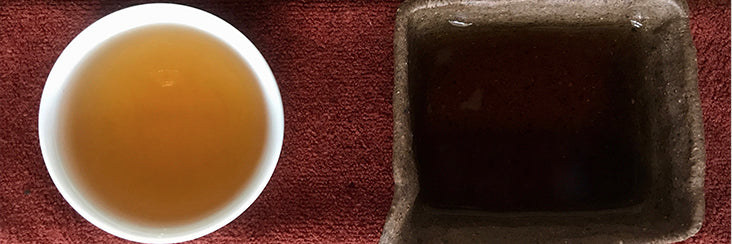
Gold Medal Award Winnng Dong Ding Cui Yu Oolong Tea Tasting Notes | Eco-Cha Tea Club

This month's batch of tea being shared with the Eco-Cha Tea Club has a rich, substantial, heavy roast character that is especially smooth and satisfying. The flavor notes include dried fruit, like plum and apricot, over a smoky, slow-roasted base.
Brewing Tip:
Given that this batch of tea was prepared for competition by removing the stems to optimize roasting results and its appearance, as well as the fact that it was heavily roasted, less leaves are necessary in brewing. We recommend a proportion of about 1:24 leaves to water. So 6-7 grams tea leaves for a 150ml tea pot.
In the photo above, notice the larger pitcher on the left side. This is to hold the remainder of each successive brew, so that each brew can be tasted separately using the smaller pitcher next to the tea cup.

The deep amber/orange color and vibrant transparency of the brewed tea indicates that the leaves were well-roasted, but carefully, over several long slow roasting sessions. When properly done, tea leaves that undergo heavy roasting, brew a rich, smooth, smoky flavored tea. Yet the color of the brewed tea is not particularly dark, and the brewed leaves are still mostly supple, and maintain a significant amount of green in their coloration.

The hybrid strain of Cui Yu (翠玉), a.k.a. Tsui Yu, or Jade Oolong, can withstand traditional processing methods of heavier oxidation and roasting with good results. This hybrid strain that became popular in the late 1980's and 1990's along with Jin Xuan, is now becoming relatively rare. This is due to the fact that it produces less yield than Jin Xuan and Four Seasons Spring, and it is a bit less hardy and versatile in its growing conditions than these other two hybrid strains.
So this month's batch of the Eco-Cha Tea Club is a Taiwanese invention of a hybrid strain that has seen its heyday, and is slowly dwindling in its cultivation. This, combined with the fact that this batch received a Gold Medal Award in a local competition that represents traditional tea making, puts it in a category of its own. We feel that it represents Taiwan's Tea Culture in both a traditional and a modern way.

LET US KNOW!
We really want to know what you think! Leave your impressions or questions in the comment section below!
SUBSCRIBE!
If you enjoyed this post and would like to hear more about the specialty tea industry here in Taiwan, follow us on YouTube, Facebook, and Instagram and please subscribe to our newsletter. Subscribe now and get $5 off your first order!

